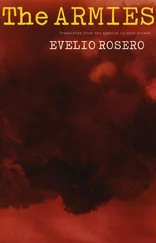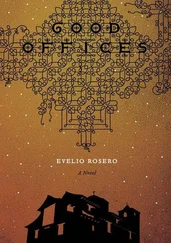“I live in the hope of your love, the hope that one day you will open up for me like a flower, mistress of my pain,” he said and recited “ sweet and sacred little light within my heart ,” and chided her: “You’ll never imagine what you’re missing out on, not letting me adore you.”
“God, what are you saying? Do you know what you’re saying to me?”
Astonishment made her voice crack; another wave of heat washed over her; Arcaín Chivo renewed his wandering, his hand high inside her skirt.
“Don’t do that,” Primavera seemed to beg with a groan, mute laughter playing across her flushed face the whole time, and she lifted her free leg slightly and rested her foot on the kneeling professor’s shoulder (so that for a blazing moment Arcaín Chivo could see she was entirely naked beneath her skirt); oh unattainable sex, he thought, and was able to stammer “unattainable Primavera,” incredulous at such joy, and as Primavera moved he believed he managed to detect, on the air that wafted from inside her skirt, her most intimate scent, a sort of bitter sweetness, he thought, and now in a trance he was straining his neck head face mouth much further in to her when she pushed her foot against him with all her might and the professor collapsed backwards against a cabinet amid a clatter of saucepans and spoons, which simultaneously crashed down on his head.
“Arcaín’s just fallen over,” came Primavera’s nervous announcement. “Something happened. He’s hurt himself.”
The others arrived: three long, grey shadows leaned in through the doorway. The professor had hit the base of his skull, hard.
“I think I’ve had too much to drink,” he said, half getting up. The doctor himself held out his hand and helped him.
“I think I’d better go, señores ,” Arcaín Chivo continued, and it was impossible to tell whether he felt angry or overwhelmed with delight — he did not know himself.
“Us too,” responded the bishop. “I’ll drop you home, Arcaín. It’s all been quite enough, if not too much. There are holidays on the horizon, but that doesn’t make the days any easier to get through, eh, Justo Pastor? Promise me we’ll meet again before carnival.”
“I promise,” the doctor replied. He could not take his eyes from his wife’s flushed face, the face that was looking right back at him, happy.
But the joy on Primavera’s face drained away as soon as they were alone, as the guests’ voices on the other side of the front door grew fainter; she crossed the living room at once and started to go up the stairs, with the doctor behind her, neither of them hurrying, but escaping and in pursuit.
When they got to the first-floor landing the doctor took her by the arm and made her stop. “We need to talk,” he said. “I’m going to see if the girls are asleep,” she responded. With a brisk jerk she shook off her husband’s hand, and carried on going upstairs. He hesitated over following her: in the end he headed for the study on the first floor, still hoping to find the recordings, or at least the paper transcriptions. He spent a long time there, in the office, rummaging through files, all to no avail: he had already lost the urge to ask Primavera about the tapes and start another row. He went up to the second floor with the intention of going to bed and putting the world out of his mind, but saw Primavera in Luz de Luna’s bedroom, leaning over her sleeping daughter, and to see Primavera so calm, in peaceful silence, reawakened his impotent rage and the misery of depending on — or not depending on, more like it — a woman like her. Would he ask her about the tapes, without worrying about the row? He remembered his daughters were sleeping. My God, he said to himself, was it possible Primavera had stolen the tapes?
He chose to go back down to the first floor: he turned on all the lights, went in to the guest room, the laundry room, the room with the ping-pong table in it — all lined with further bookshelves — and in each room he continued his search, for endless minutes. Absolutely nothing. How long ago did he lose track of the recordings? He could not remember. Didn’t he keep the tapes in a Cuban cigar box? Where did he hide that box? Why was his work — the only thing he had going for him — in such a muddle? The final room on the first floor was the toy room, and that was where he headed. He switched on the light: wooden Pinocchios, cuddly bears, lizards and whales, giant mice, penguins, plastic dolls and wind-up ones, puppets, wooden horses, electric trains, rubber ducks, tin soldiers, ballerinas, fairies and elves on strings all seemed to greet him at once with the most monstrous guffaw — that’s what he heard — a freakish laugh issuing from deep within the toys as they lay piled in heaps against the walls, like multiplied versions of his own daughters.
In the middle of the room there was a table for playing Chinese chequers, with a huge bouquet of red roses in a vase and four chairs set round about. He tried to remember the last time he had sat at this table with his daughters: it was years ago. But he could not recall them putting bunches of roses on the games table. What kind of game was this? There was a card stuck to the vase. He read, From an undying admirer , and, almost immediately, felt the presence of his wife, who had just come in, noiselessly, behind him.
“What?” she said. “Now you’re going to play with dolls?”
He did not answer. Nor did he turn around. But he detected the apprehension in Primavera’s voice, the doubt: had he read the card?
“I need the tapes,” he said in the end.
“Well of course I haven’t got them,” she replied. Her voice had gone back to normal, the same old steady mockery. “I expect the toys have them, to play with.”
He turned to look at her: she was coming towards him from the door, without hesitation. The games table stood between them. The bright light in the room shone into their faces and made them blink.
“What do you know about the float, what have they told you, what are they telling you to do about it?” the doctor asked.
“Something to do with Simón Bolívar,” she said, “the father of the nation, I believe. I know the governor has taken steps. You’re getting into a mess, and it doesn’t matter to me. I don’t care if you get yourself in all the damn messes in the world, but do it on your own. Seráfico told me you want to sell the finca . You’re dragging me and the girls into your insanity, don’t you see?”
“You never know what you’re talking about,” the doctor said. He sighed resignedly. He was about to leave when Primavera made him pause with a bitter, muffled cry.
“Idiot,” she said.
And then:
“They can even put you in prison for mocking Bolívar, the father of the nation.”“Did your General Aipe tell you that? Was he able to speak?”
“Luckily for you, he can speak now. He had to go to Bogotá, to specialists. It wasn’t serious, fortunately for you.”
He spun around, possessed; knocking two of the chairs out of the way with a sweep of his hand, he reached her in two strides and grabbed her by the hips; he was behind her, pushing her forward against the edge of the table. The vase overturned; water splashed out among the blazing roses.
“What father of what nation?” he yelled. “Father of your General Aipe, more like.” And he loomed still further over her, and, holding her around the waist with one arm, yanked up her skirt in one go with the other; her naked backside glowed, very white. “So, nobody’s ever nibbled your thighs?” he asked, as though he were choking. He did not recognize himself.
“You sod!” she shouted. “Run back to your pregnant women!”
“The father of the nation is the sod.”
Читать дальше












